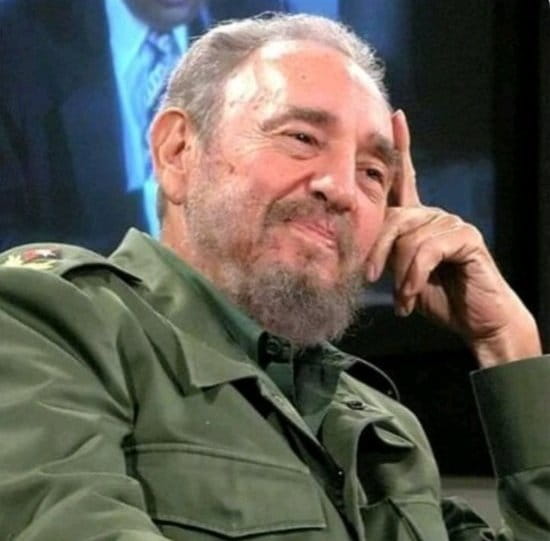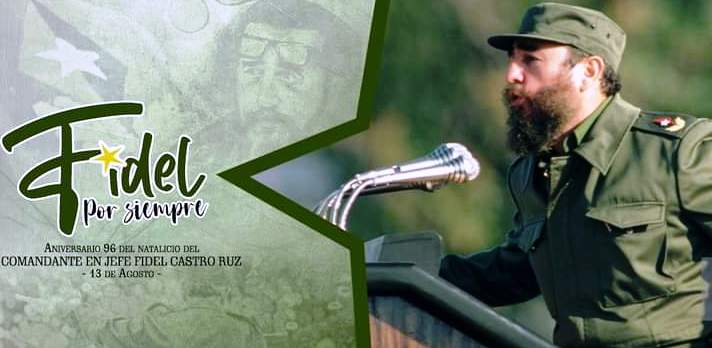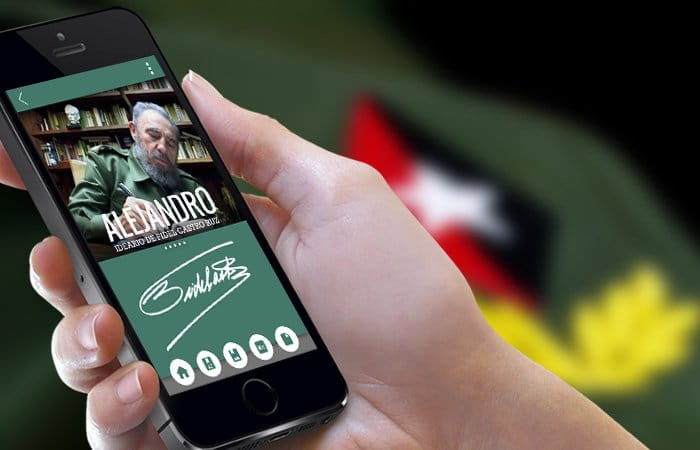
Fidel Castro: A fruitful life, a source of motivation, of humanism
With a very fruitful, prolonged and enriched life through 90 years, Fidel Castro Ruz, the Commander in Chief, the maximum leader of the Revolution, continues to be a source of motivation not only for the Cuban people but also for many men and women in different parts of the world for the significance and validity of his legacy.
His birth took place on August 13, 1926 in the Birán area in the then province of Oriente.
He attended primary school in a small primary school that his father created on the farm where he settled and later continued studying in the city of Santiago de Cuba.
Very young Fidel came into contact with Havana. He first studied at the religious school in Belén and later entered the University of Havana.
It was in that great educational center that he obtained his Law Degree, and where, as he pointed out years later, he was also trained as a revolutionary.
Precisely on September 4, 1995, when giving a speech on the occasion of the beginning of the 1995/96 school year and the 50th anniversary of having begun his studies at the Law School, Fidel pointed out that it was a privilege to enter that university, “because here I learned a lot, and because here I learned perhaps the best things of my life; because here I discovered the best ideas of our time and of our times, because here I became a revolutionary…”
And Fidel also specified: "In this university I lived through difficult times, very difficult, so difficult that it is a true chance, even, to have survived those university years."

Since he was a university student, Fidel felt constantly influenced by the transcendence of the life and legacy of José Martí, the Apostle of Cuba's independence.
That was how, after the coup d'état had taken place in Havana on March 10, 1952, the already young lawyer Fidel Castro immediately condemned the imposed dictatorial regime and evidenced his decision with concrete facts to fight for Cuba and its people.
Precisely in October 1953, when he was judged for having organized and carried out the assault on the "Moncada" and "Carlos Manuel de Céspedes" barracks, in the year of the centenary of Martí's birth, he came to assure: "I have in my heart the doctrines of the Master and in the thought the noble ideas of all the men who have defended the freedom of the peoples.”
He considered Martí as the intellectual author of the actions carried out by a group of young revolutionaries, headed by him, who tried to occupy the military fortresses of Santiago de Cuba and Bayamo, respectively, on July 26, 1953 for once. seized the weapons existing there to make a call to the people to unleash a popular armed insurrection against the reactionary military dictatorship existing in the country after the coup that occurred on March 10, 1952.
The planned actions did not conclude with the expected success because in both cases the surprise seizure of the military installations failed.
But Fidel turned the setback into a political victory when, in the legal process that followed, he denounced the crimes committed by the soldiers of the dictatorship against his comrades, judged the critical situation in the country, and exposed a revolutionary program.
Starting in October 1953, Fidel firmly faced the prison and in 1955, after being released by a general amnesty that the dictatorial regime decreed due to popular pressure that demanded the release of the assailants of Moncada and Carlos Manuel de Céspedes, he immediately reorganized the Revolutionary Movement, which then identified itself with the date of July 26 and later left for Mexico to achieve the regrouping and preparation of those who in 1956 participated in the expedition of the Granma yacht to Cuba.
Between December 1956 and the end of 1958 he successfully led the liberation war until January 1959 when the Revolution triumphed.
On January 1, he entered Santiago de Cuba victorious and there he assured when speaking to the inhabitants of that heroic city: "We have finally arrived in Santiago! The road has been hard and long, but we have arrived." And he added: "The Revolution begins now, the Revolution will not be an easy task, the Revolution will be a tough undertaking full of dangers."

Several days later, upon arriving in Havana at the head of the Freedom Caravan, Fidel assured on January 8, 1959: "When I hear of columns, when I hear of combat fronts, more or less numerous troops, always I think: here is our strongest column, our best troop, the only troop that is capable of winning the war alone, that troop is the people.”
With a close relationship with the people, Fidel as the maximum leader of the Cuban Revolution carried out a work that not only had repercussions in the lives of Cubans but also internationally.
And in the multiple speeches he gave, both in Cuba and in other countries he visited, as well as at international events, and in his journalistic works and in the Reflections he produced, he exposed a large number of concepts and principles that continue to be a source of teaching and that become a reality in the daily work of the people when they even have to face difficult situations such as those that occurred these days during the confrontation of a large fire at the supertanker base in the city of Matanzas.
And on this 96th anniversary of Fidel's birth, we remember, just to quote a fragment of what he pointed out, that he highlighted, on December 5, 1961:
“History is not written with cowards or traitors, history is written and made with men of the people, with men and women with a whole heart. History is written with brave men, history is written with heroes, history is written with revolutionaries. And history is written by the humble, history is written by those who work with their arms, history is written by those who work honestly with their intelligence, history is written by the clean, history is written by the honest, history is written by the loyal.”
